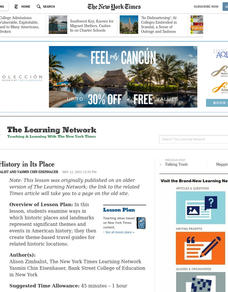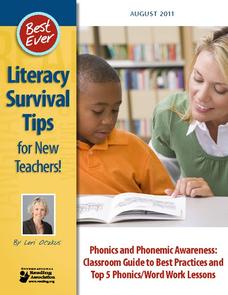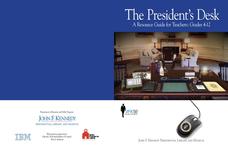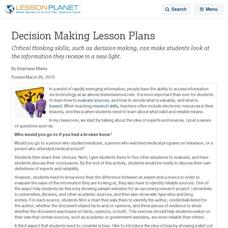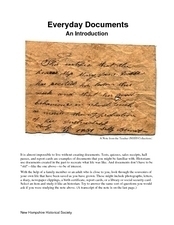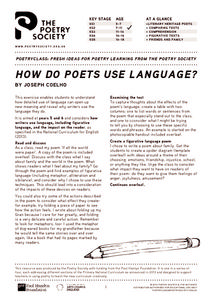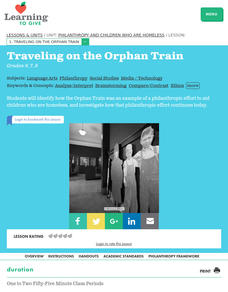Curated OER
Putting History in its Place
Examine ways in which historic places and landmarks represent significant themes and events in American history. Then create theme-based travel guides for related historic locations. This lesson requires informational reference materials...
Curated OER
A New Era for Palestinians
Get a global perspective and examine the challenges facing Mahmoud Abbas, the newly elected president of the Palestinian Authority. Thoughtful classroom citizens write letters to Mr. Abbas, asking him questions and suggesting advice....
Curated OER
Is That a Fact?
Investigate popular scientific claims and gather evidence to defend or argue against an author's stance. Writers synthesize information and compose their own "Really?" columns modeled after those found in the weekly "Science Times"...
Curated OER
Citizens of the Future
Young sociologists explore how local, state, and federal governments work. This very impressive and ambitious lesson requires pupils to contact government officials who represent them and their families. They research elections, and hold...
IBM
What Path Will You Follow?
"What do you want to be when you grow up?" is a question every kid has to answer quite often. Here is a lesson that will allow them to do some thinking about that very topic, and to learn about some professions they might consider...
Curated OER
Introduction to Canada
Ninth graders investigate the country of Canada by examining their media in this geography lesson. They use the Internet to research Canadian newspapers and analyze a topic covered by both US and Canadian media sources. After comparing...
Discovery Education
Mood Music!
Grouchy? Sad? Here's a great resource that shows kids how music can be used to lift their spirits. Kids collect and chart data on the effects of music on emotions. After analyzing the results of their experiment, they develop...
PBS
Act of Duty
PBS provides educators with this "Utilization Guide," a four segment program that covers the Civil War, World War I, World War II, the Korean conflict, Vietnam, and the Gulf War. The 42-page packet includes lessons, background...
International Reading Association
Literacy Survival Tips for New Teachers!
Whether new to teaching or a seasoned pro, this 12-page phonics and phonemic awareness guide is a must for your curriculum library. Everything from a summary of research on the topic to exercises and activities is included.
Staples Foundation For Learning
The President’s Desk
What stories can a desk paperweight and picture frame possibly tell us about the president of the United States? Pupils are transported to the desk of President John F. Kennedy through an engaging interactive site. The guide offers...
Core Knowledge Foundation
Unit 4: The Renaissance
The Renaissance is the theme of a five-week unit designed to boost reading comprehension, spelling, vocabulary, and expository writing skills. Scholars listen to and discuss daily readings and engage in skills practice activities...
Curated OER
Decision Making Lesson Plans
Critical thinking skills, such as decision making, can make students look at the information they receive in a new light.
Curated OER
Everyday Documents
Almost more of a lesson than a activity, this particular resource has learners examine different types of historical documents. There is a historical docment embedded in the activity that learners study, and they also bring in documents...
Poetry Society
How do Poets Use Language?
Why do writers choose the language they do? Here's a resource that has the poet himself answer that very question. Joseph Coelho explains why he chose the words and images he used in his poem, "If All the World Were Paper."
Perkins School for the Blind
Accessible Labels
When you're blind it is extremely important to be able to navigate your environment in as independent a way as possible. This idea isn't a activity, but it is a great way to foster independent mobility and literacy skills while making...
Mr. Roughton
The Maya Files
Class members adopt the role of Law and Order history investigators and examine primary source documents to determine the legitimacy of Marco Polo's claim that he traveled to and traded in China. A cleverly crafted...
Teacher's Corner
Diamonte (dee-a-MON-tay)
Did you say a diamonte? Ask your young poets to craft and polish this gem of a form poem. The fifth in a series of ten poetry writing exercises.
Core Knowledge Foundation
Immigration Tell It Again!™ Read-Aloud Anthology
The read-aloud unit focuses on immigration. Scholars hear stories about people's sacrifices and their journey to and experience in another country. Pupils discuss readings, practice vocabulary skills and participate in extension...
Core Knowledge Foundation
Fighting for a Cause Tell It Again!™ Read-Aloud Anthology
A read-aloud anthology highlights the essential contributions of activists Susan B. Anthony, Eleanor Roosevelt, Mary McLeod Bethune, Jackie Robinson, Rosa Parks, Martin Luther King Jr., and Cesar Chavez. Scholars listen to stories,...
Curated OER
Philanthropy And Children Who Are Homeless Lesson 1: Traveling on the Orphan Train
Middle schoolers research how the Orphan Train was an example of philanthropy that was aimed at aiding homeless children. They determine how this philanthropic effort continues now by researching contemporary relief agencies. They...
Curated OER
Philanthropic Literature Lesson 1: The Lonely Fish
Young scholars investigate the concepts of sharing and good citizenship, and how they contribute to a peaceful society. They work on problem solving and critical thinking skills after listening to Marcus Pfister's, The Rainbow Fish.
Curated OER
Our Constitutional Connection Lesson 3: To Vote Or Not To Vote? That is the Question!
Students design colorful posters to "get out and vote" after studying the three amendments to the US Constitution that extend voting rights. They analyze the importance of voting to a healthy democracy.
Curated OER
A Colony is Born : Lesson 6 -To Leave or Not to Leave
Fifth graders connect reasons for coming to the New World with identity. The create identities and place them in one of three settled regions. They refer to prior study notes in their Colonial Notebooks to establish their identities.
Facing History and Ourselves
Eyes on the Prize Lesson 1: The Philosophy of Nonviolence
Students explore the concept of nonviolent demonstration. In this Civil Rights Movement activity, students investigate examples of injustice and discuss the philosophy of nonviolence fueled by leaders of the movement. Students apply...
Other popular searches
- Fifth Grade Library Lessons
- Library Lessons K 2
- Elementary Library Lessons
- Library Lessons & November
- Kindergarten Library Lessons
- Library Lessons Grade
- Library Lessons for Preps
- Halloween Lessons Library
- Teks Library Lessons
- Library Lessons on Blogs
- Third Grade Library Lessons
- Library Lessons Grade 7
